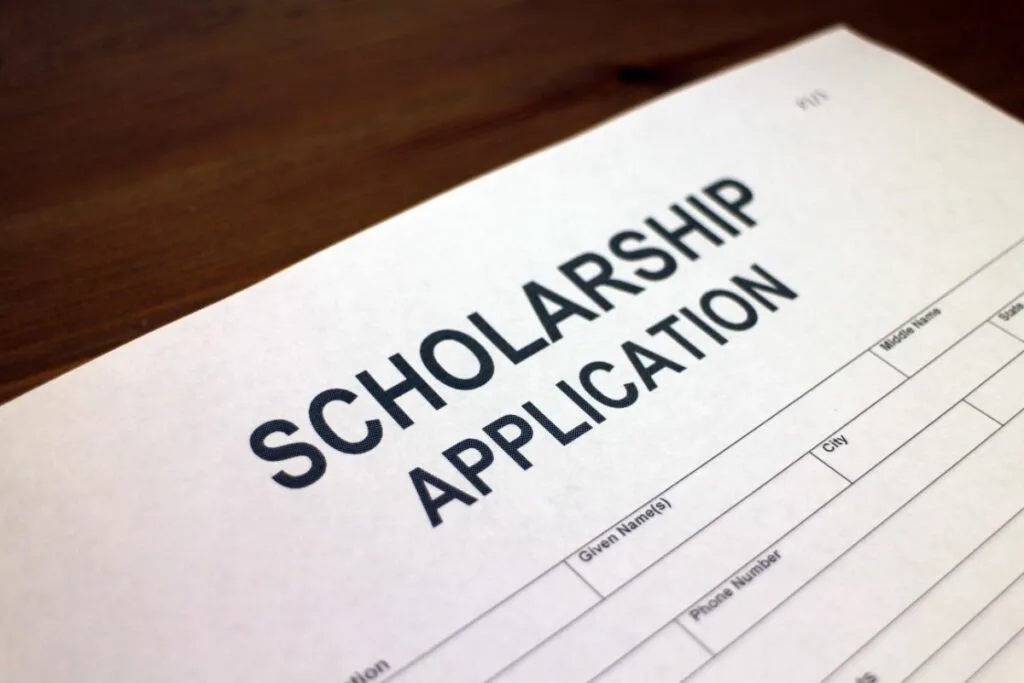When a student applies for a scholarship, they may be asked to submit a scholarship recommendation letter as part of the application.
And, if you’ve been influential in their life, you may be the person they choose for this letter.

If you are asked to write a letter of recommendation, it can be a real honor, but it’s also nerve-wracking as you want to do the best job possible for the person applying.
In this guide, we’ll walk you through how to write a scholarship recommendation letter and provide a structure and some examples for you to follow.
You’ve got this!
Who Can Write A Letter Of Recommendation?
In most instances, the student will choose a favorite teacher or professor to write their letter.
Mentors, employers, or voluntary work supervisors can also give letters of recommendation.
Some scholarship programs will ask for more than one type of recommendation letter – in those instances, a student may approach a teacher for a professional recommendation and a friend for a personal one.
What Makes An Excellent Scholarship Recommendation Letter
A good letter of recommendation is concise but still manages to convey all of the student’s achievements. Aim to write about 300 words and no more than 500 words.
Start by explaining who you are, how long you have known the student, and in what capacity.
Make sure you’ve studied the requirements of the scholarship and then illustrate why the student would be the best person for the scholarship.
Share some of the student’s strengths and academic achievements and give some solid examples of these.
If you have any extracurricular examples, it’s also worth mentioning them.
You may also want to discuss the student’s personal qualities and positive characteristics – talk about what makes them stand out as a good candidate.
It’s vital to make sure your letter reads well and has had a thorough spelling and grammar check.
How To Structure A Scholarship Recommendation Letter
When writing a scholarship recommendation letter, it can be helpful to start with a basic structure, like the one we’ve included below:
[Your Name]
[Your Title/Position]
[Your Institution/Organization]
[Your Email Address]
[Your Phone Number]
[Today’s Date]
[Scholarship Committee’s Address]
[Scholarship Committee’s Name (if known)]
[Scholarship Name (if specific)]
Dear [Scholarship Committee’s Name or “Scholarship Selection Committee”],
- Introduction:
- Academic Achievements:
- Extracurricular Achievements and Character:
- Scholarship Relevance:
- Personal Anecdote (Optional but effective):
- Conclusion:
- Offer to Provide Further Information:
Sincerely,
[Your Handwritten Signature (if submitting a hard copy)]
[Your Typed Name]
Starting with the above structure, you can then expand each section and provide details on why the student will be perfect for the scholarship program, using our tips above.
Additional Tips For Writing An Effective Scholarship Recommendation Letter
We’ve included our top tips for creating the best possible letter:
- Personal Touch: While you should keep the letter professional, adding a personal touch or anecdote about the student can give the letter a genuine feel.
This will help the committee connect with the student on a more personal level, showcasing not only their academic achievements but also their personal values and their character.
- Be Specific: When mentioning the student’s achievements or characteristics, be specific.
Instead of just saying they are “hardworking,” give a particular instance or project they worked on that showcased their dedication.
- Maintain a Positive Tone: Always focus on the positive aspects of the student. If you have reservations or can’t genuinely recommend the student, it’s better to decline writing the letter.
- Relevance is Key: Ensure that the points you mention are relevant to the scholarship in question.
If the scholarship is for leadership, highlight the student’s leadership skills. If it’s for academic excellence, focus on their scholarly achievements.
- Keep It Timely: If there are recent achievements or milestones the student has reached, include those in the letter.
This gives a more current and up-to-date representation of the student.
- Format and Presentation: If you’re submitting a hard copy, ensure it’s printed on official letterhead. The presentation matters as it gives a professional touch.

Scholarship Recommendation Letter Examples
Below, we’ve created some sample sections to include in your recommendation letter:
Introduction
“I am writing to recommend [Student’s Full Name] for the [Scholarship Name]. As [Your Title, e.g., “his Chemistry teacher for two years”], I’ve observed his dedication, intelligence, and determination firsthand.”
Academic Achievements
“In his tenure at [School/College Name], [Student’s Name] consistently ranked in the top 5% of the class. He was not just content with his own performance but often assisted peers in study groups, showcasing both his mastery of the subject and his collaborative nature.”
Extracurricular Achievements and Character
“Beyond the classroom, [Student’s Name] played a pivotal role in the school’s chess club, leading the team to a state championship. His ability to strategize and lead serves as a testament to his problem-solving skills and leadership qualities.”
Scholarship Relevance
“Given that the [Scholarship Name] values community service, I’d like to highlight [Student’s Name]’s relentless commitment to our community clean-up program. He initiated, organized, and led a team of students every month to help keep our community parks clean.”
Personal Anecdote
“I recall an instance when [Student’s Name] spent weekends tutoring a fellow student struggling in Chemistry. Not only did the student’s grades improve, but [Student’s Name] also helped instill confidence in him. This act was not for extra credit, but purely out of kindness.”
Conclusion
“Considering [Student’s Name]’s exceptional academic and extracurricular achievements, combined with his integrity and drive, I am confident he will be an outstanding candidate for the [Scholarship Name].”
Example Letters
And, if you’re still looking for inspiration on how best to write your scholarship recommendation letter, take a look at these example scholarship recommendation templates:
In Summary
Remember, a scholarship recommendation letter can play a crucial role in the decision-making process for the scholarship committee.
Taking the time to write a thoughtful, well-structured letter can make all the difference in the student’s chances of receiving the scholarship.
- Homeschooling In High School: Pros And Cons - February 24, 2024
- How Do I Withdraw My Child From School To Homeschool? - February 23, 2024
- How To Not Go Crazy Homeschooling Kids: A Guide For Frazzled Parents - February 22, 2024









Leave a comment